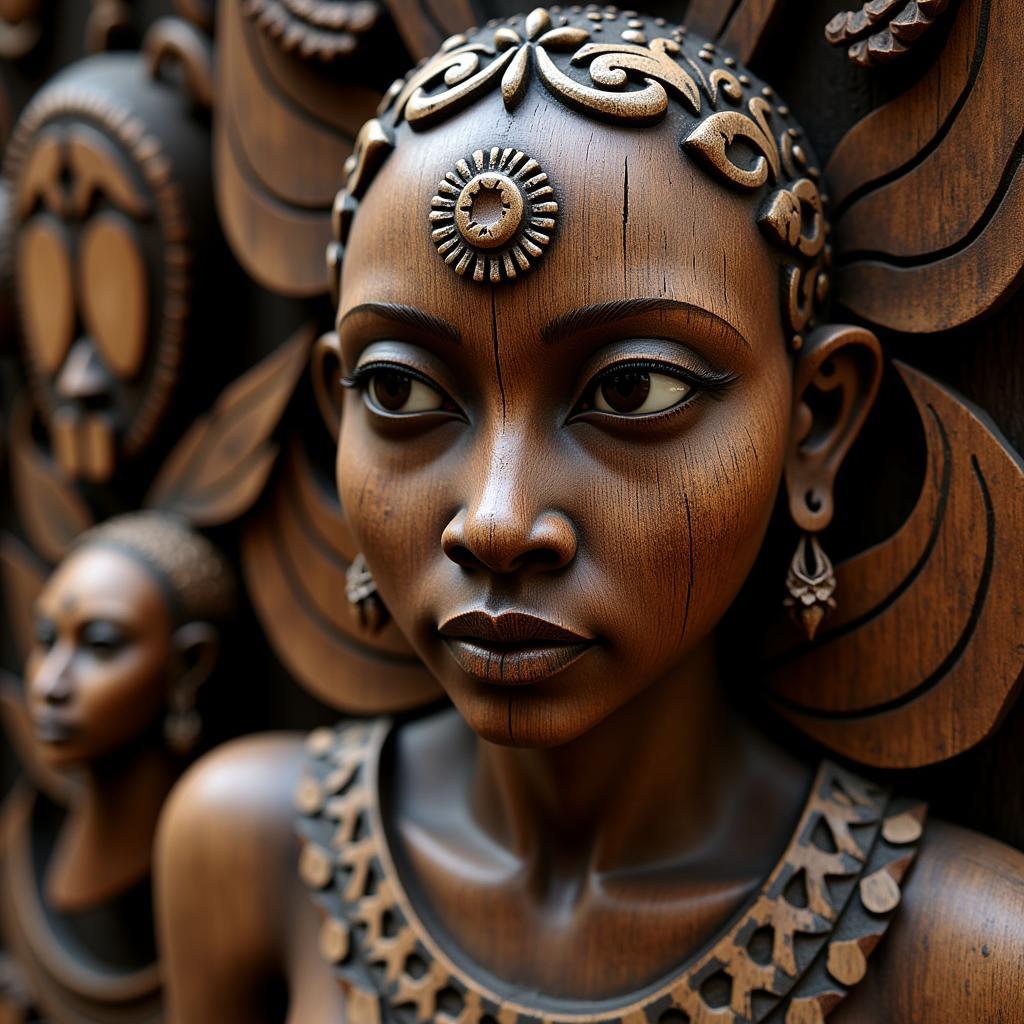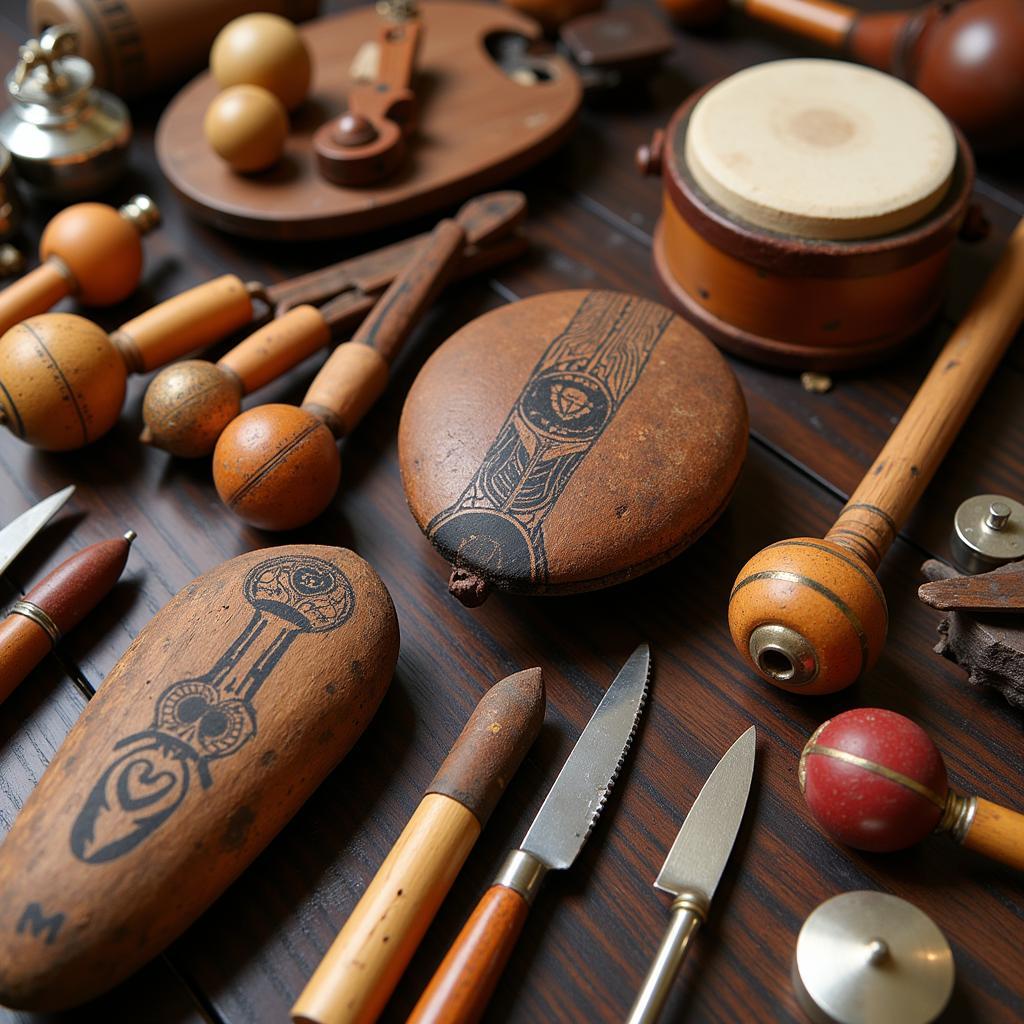Unveiling the Mysteries of the African Forest Goddess
The captivating allure of the African Forest Goddess draws us into a world of ancient traditions, spiritual beliefs, and profound connections to nature. These powerful deities embody the life force of the forests, representing fertility, protection, and the delicate balance of the natural world. Let’s embark on a journey to explore the diverse representations and cultural significance of these revered figures.
Who are the African Forest Goddesses?
Across the vast continent of Africa, numerous ethnic groups venerate their own unique forest goddesses. These deities are not monolithic; their stories, attributes, and domains vary widely, reflecting the specific ecological and cultural contexts in which they are worshipped. From the lush rainforests of Central Africa to the woodlands of West Africa, these goddesses embody the spiritual power and vital importance of the forest ecosystem. Some are associated with specific animal spirits, like the leopard or the python, while others are linked to particular trees or plants. This connection highlights the deep-seated relationship between humans and nature that pervades African spiritual traditions. Did you know some goddesses are believed to guide hunters and protect villages from harm?
From ancient myths and oral traditions passed down through generations, we gain glimpses into the rich tapestry of beliefs surrounding these powerful entities. They are often depicted as guardians of the forest, protectors of wildlife, and bestowers of abundance. They represent the cyclical nature of life, death, and rebirth, mirroring the rhythms of the natural world. They are also often seen as mediators between the human and spirit realms.
For a look into African female tribes, check out this insightful article about African female tribe.
The Role of the African Forest Goddess in Traditional Societies
The African forest goddess plays a pivotal role in the social, spiritual, and economic life of many traditional communities. Their influence extends beyond the realm of the sacred, shaping customs, rituals, and daily practices. They are invoked during ceremonies related to agriculture, hunting, healing, and rites of passage. Their blessings are sought for successful harvests, protection during hunts, and the well-being of the community.
Guardians of Nature and Fertility
Many forest goddesses are closely associated with fertility, both human and environmental. They are seen as the source of life and abundance, ensuring the continuation of the community and the flourishing of the natural world. Their power is believed to manifest in the growth of crops, the fertility of animals, and the birth of healthy children. Some cultures offer prayers and sacrifices to the forest goddess to ensure a bountiful harvest or to request children. You might find this article about African fertility prayer enlightening.
Protectors and Healers
The forest goddess is also revered as a protector and healer. She is believed to ward off evil spirits, protect communities from harm, and cure illnesses. Many traditional healers invoke the power of the forest goddess in their practices, using plants and herbs gathered from the forest as remedies. This connection highlights the integral role of the forest as a source of both spiritual and physical healing.
Mediators Between Worlds
In many African spiritual traditions, the forest goddess acts as a mediator between the human and spirit realms. She is seen as a conduit to the ancestors and other spiritual beings. Through rituals and offerings, individuals seek her guidance and intercession in matters of importance. This mediating role underscores the interconnectedness of the physical and spiritual worlds in African cosmology.
Learn more about an African deity’s story in this compelling piece: African diety aja story.
Representations and Symbolism
African forest goddesses are often depicted in various forms, including human, animal, or a combination of both. Their iconography is rich with symbolism, reflecting their attributes and powers. Common symbols include trees, plants, water, animals, and celestial bodies. These symbols often represent specific qualities such as strength, wisdom, fertility, and healing.
 Wooden Sculpture of an African Forest Goddess
Wooden Sculpture of an African Forest Goddess
The Power of Storytelling
Stories and myths about African forest goddesses play a vital role in transmitting cultural values and beliefs. These narratives often contain moral lessons, explanations of natural phenomena, and insights into the relationship between humans and the divine. They serve as a powerful tool for education and cultural preservation.
The African Forest Goddess in Modern Times
Despite the influence of modernization and globalization, the belief in and reverence for African forest goddesses persists in many communities. While practices and interpretations may have evolved over time, the core values of respect for nature, spiritual connection, and community well-being remain strong. These goddesses continue to inspire artistic expression, cultural identity, and a deep appreciation for the natural world.
This article sheds light on the rich and diverse traditions surrounding African forest tribe goddesses. For further exploration, discover more about African forest tribe goddess here.
Conclusion
The African forest goddess stands as a powerful symbol of the interconnectedness between humans and nature. These deities embody the life force of the forest, representing fertility, protection, and the delicate balance of the natural world. Their enduring presence in African cultures underscores the profound spiritual significance of the forest and its vital role in sustaining life. By understanding and appreciating these traditions, we gain a deeper understanding of the rich cultural heritage of Africa and the enduring power of belief.
FAQ
-
What are the common characteristics of an African forest goddess? Many are associated with fertility, protection, and healing, and often linked to specific animals or plants.
-
How are African forest goddesses typically depicted? They can be represented in human, animal, or combined forms, often incorporating symbolic elements like trees, water, and celestial bodies.
-
What role do these goddesses play in traditional societies? They influence customs, rituals, and daily practices related to agriculture, hunting, healing, and rites of passage.
-
Are these beliefs still relevant today? Yes, while practices may have evolved, the core values of respect for nature and spiritual connection remain strong.
-
Where can I learn more about specific African forest goddesses? Research specific ethnic groups and their associated deities for more in-depth information.
More Questions?
Explore these related articles for further insights: 5 african animals.
Need Help?
Contact us 24/7 for assistance:
Phone: +255768904061
Email: kaka.mag@gmail.com
Address: Mbarali DC Mawindi, Kangaga, Tanzania.


